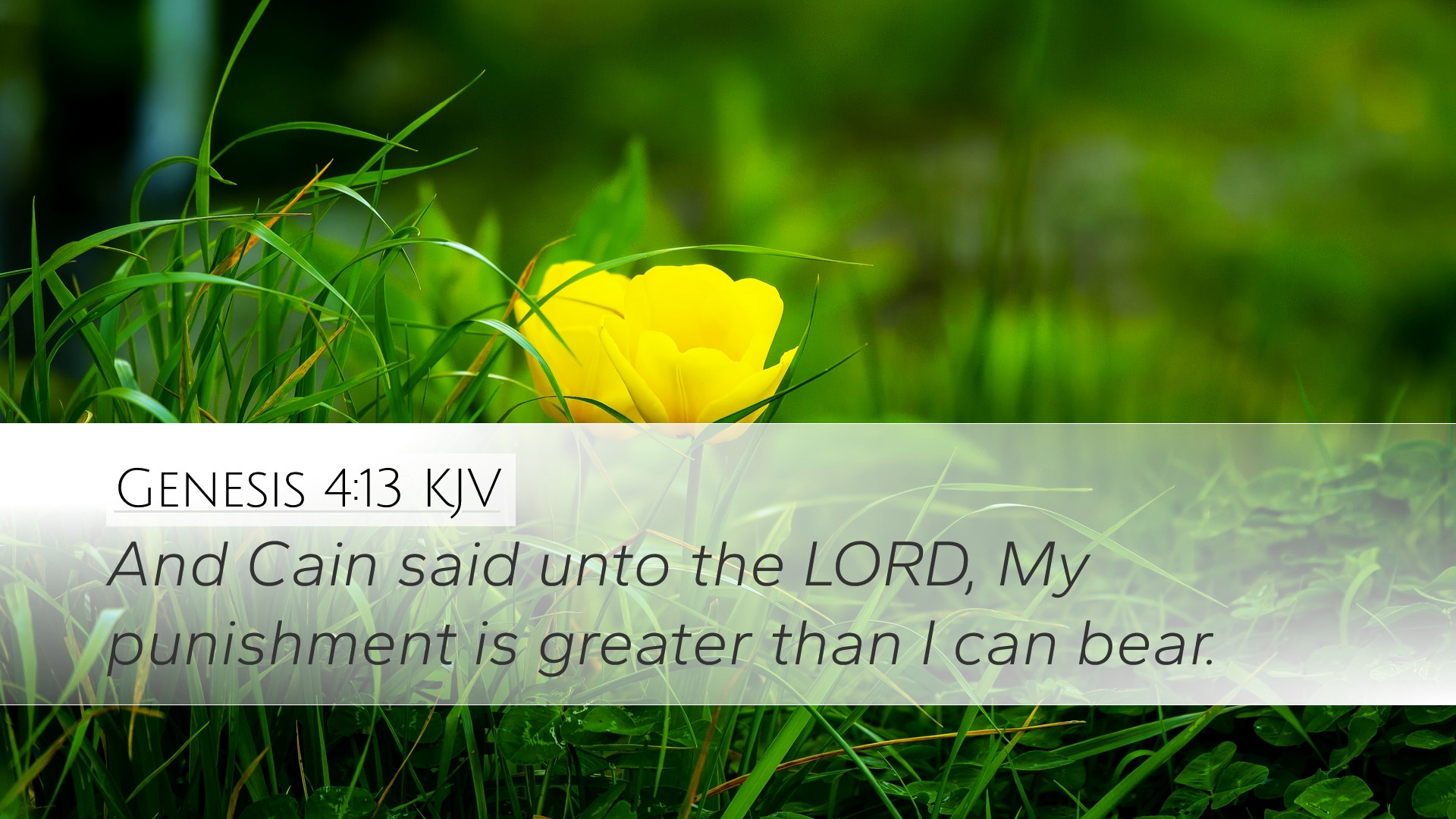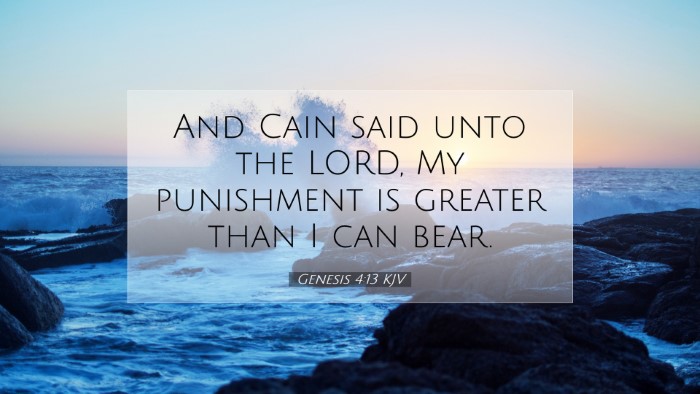Commentary on Genesis 4:13
Genesis 4:13 states, "And Cain said unto the LORD, My punishment is greater than I can bear." This verse follows the account of Cain's sin of murdering his brother Abel, highlighting Cain's response to God's judgment on him.
Contextual Overview
The narrative of Cain and Abel is foundational within the Genesis account, illustrating profound themes of sin, guilt, and divine justice. Cain’s violation of God's command leads to severe consequences, and this particular verse captures the essence of his despair.
Key Insights from Commentaries
Matthew Henry's Commentary
Matthew Henry focuses on the severity of Cain's realization of his guilt. Henry points out that Cain's statement reflects an acute awareness of the weight of his punishment, alongside a greater truth of human sinfulness:
- Weight of Guilt: Cain acknowledges that his punishment exceeds his ability to endure it, suggesting a deep understanding of the consequences of his actions.
- Divine Justice: Henry emphasizes that God’s judgment is not arbitrary; it comes as a necessary response to Cain's grievous sin.
- Human Despair: The verse encapsulates the human condition related to sin and its repercussions – a theme resonating through scripture.
Albert Barnes' Commentary
Albert Barnes provides a perspective that complements Henry by highlighting the notion of mercy intertwined with judgment:
- Nature of Punishment: Barnes interprets Cain's cry as a complaint about the severity of his punishment, addressing the emotional turmoil and fear that accompanies divine judgment.
- Comparison with Abel's Innocence: The contrast between Abel's innocence and Cain's guilt serves as a poignant reminder of justice and mercy, as Abel's blood cries out to God.
- God’s Response: Barnes notes that despite Cain’s lament, God provides a mark of protection, suggesting the complexity of divine justice and mercy.
Adam Clarke's Commentary
Adam Clarke delves into the psychological implications of Cain's statement and the broader biblical theology surrounding it:
- Cognitive Dissonance: Clarke argues that Cain’s protest reflects an internal struggle between acknowledgment of guilt and the overwhelming nature of his punishment.
- Symbolic Meaning: His statement also serves as a foreshadowing of the need for redemption. Clarke links this moment to the overarching theme of humanity’s need for a savior.
- Legacy of Sin: Clarke suggests Cain’s cry is symbolic of the legacy of sin in humanity, illustrating how sin leads to feelings of despair and separation from God.
Theological Implications
The verse invites readers to explore several theological dimensions:
- Sin and Consequences: It reaffirms the doctrine of inherent sinfulness and its inevitable consequences, a foundational concept in Christian theology.
- God’s Mercy and Justice: The tension between God’s justice and mercy is vividly illustrated; while God punishes Cain, He also provides a means of protection, maintaining His sovereign grace.
- Human Experience of Guilt: Reflecting on Cain’s despair leads to a broader understanding of how humanity grapples with guilt and the need for reconciliation with God.
Practical Applications
For pastors, students, and theologians, Genesis 4:13 serves as a rich source of reflection and preaching:
- Awareness of Sin: Encouraging congregations to acknowledge their sins and understand the weight of guilt in light of God's holiness.
- Understanding Justice: Helping believers grasp the balance of God's justice and mercy in their lives and the world around them.
- Embracing Redemption: Framing discussions around the promise of redemption that emerges through the narrative of Cain and Abel, emphasizing the hope of forgiveness through Jesus Christ.
Conclusion
Genesis 4:13 is a profound verse that encapsulates the timeless themes of sin, judgment, and the intricate balance of justice and mercy. Insights from public domain commentaries enrich our understanding of this pivotal moment in scripture, encouraging deeper theological reflection and practical application in the lives of believers.


